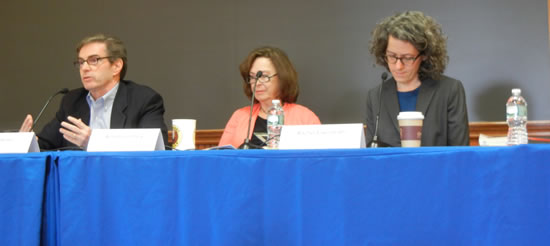Family Weekend at
Barnard College
A Combination of Shared Meals, Dance, Theater, Poetry and Camaraderie
By Dr. Pola Rosen & Yehuda Bayme

Barnard Panel at Parent Weekend (L-R) James Basker, Achsah Guibbory,
& Rachel Eisenrath
When Julia Qian, a junior at Barnard and my mentee from a city in China asked me to be her New York mother and come to family weekend because she was alone, I dropped everything and immediately said yes. What a wonderful day we both had beginning with brunch and sitting with another interesting family. We discussed travel experiences and course options, each other’s lives lived in different countries and the future.
Then on to the quad where students were painting pumpkins, faces and dancing to wonderful music of the 70s and 80s.
Next, we went, hand-in-hand to Barnard Hall for a panel discussion on poetry with one of my favorite professors, James Basker. Julia was captivated and later discovered, when we spoke to Prof. Basker, that he would soon be lecturing on campuses in China.
We decided to visit International House, a beacon of cooperative living among international students from hundreds of countries. On to cider and donuts on campus and then the theater production with Barnard students.
Julia kissed and hugged me; I was so thrilled to be on campus with her, to be of support to a wonderful young woman and to relive my own college experiences so long ago.
The Poetry Panel was vibrant; the teachers love to read poems aloud, and even if the writing style is cryptic, it is nevertheless soothing and captivating to listen to them. Speaking at the panel were Professors James Basker, Rachel Eisendrath and Achsah Guibbory.
Professor Basker discussed in detail, possible connections between the personal life of William Wordsworth and the writing of his poem, “The White Robed Negro” in 1802. Wordsworth has a big message against slavery. His words capture a moment in time conjured from his memory of a woman who flees France on his boat, back to Calais. Peering into her eyes, Wordsworth becomes sympathetic to her and publicizes the wrongful plight of her race.
Also discussed were some of the projects that students today are working on to spread the words of poetry in more ways than is currently available. Some students are anthologizing authors’ works. Others are working on translations. There are even some creative students who are compiling oral history projects so that they record solid evidence for use in tracing events or histories behind the lives of poets.
Because of the power of words, poets have the ability to, as Professor Basker mentioned, legislate without having a government role. Words can express the feelings of the times and are sometimes the least intrusive way to engage an enemy or counterproductive practice. It is an underrated source of power that, when used intelligently, can produce very good results in the hearts and minds of audiences worldwide.#
